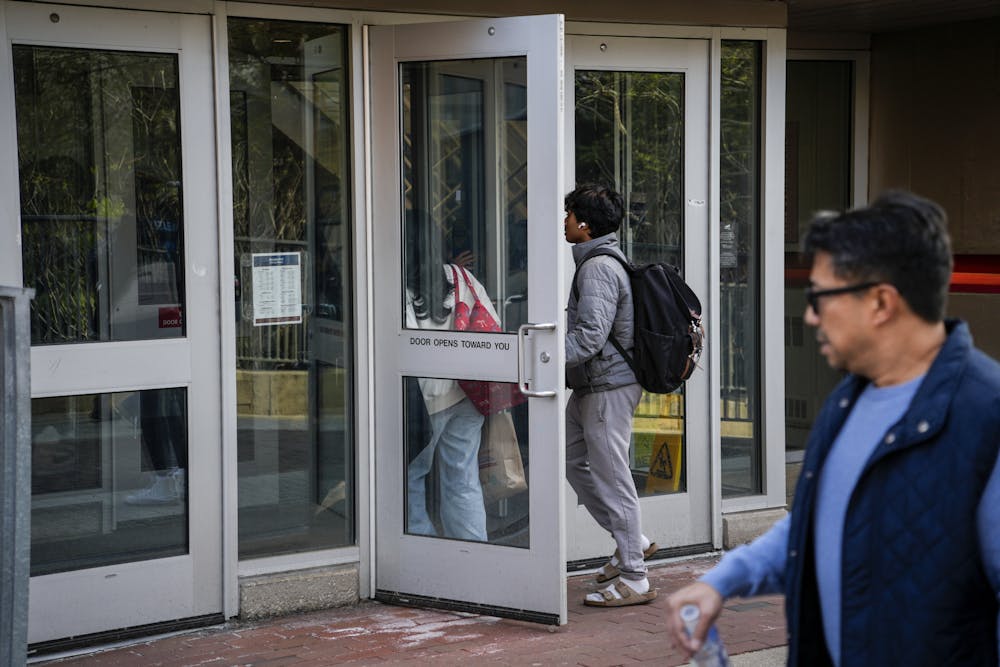
Every Wednesday afternoon, I climbed the winding stairwell of the McNeil building to the fifth floor, where my BENF 2230: “Philanthropy and Health” class met. The room had wide windows that opened out over campus, Locust Walk sprawled below while Huntsman Hall loomed directly across, its red brick exterior, ironically, almost glaring back at us. The view felt almost poetic. We sat across from a building that stands as a monument to power and profit to question something quieter — what it means to give, and who we become when we do.
Twelve of us sat in that room each week. It didn’t go unnoticed that of the twelve of us in the room, only one was a Wharton student, even though philanthropy sits at the intersection of wealth, health, and responsibility — topics you’d expect future business leaders to care deeply about.
What first drew me to this Benjamin Franklin Scholars seminar was the promise of action. We knew that by the end of the semester, we’d be giving away actual money to a local nonprofit after weeks of research, debate, and a collective decision as a class.
Each week our professor, Femida Handy, stepped into the room ready to guide, challenge, and weave our ideas into something far more thoughtful than any single voice could create. But the real value of the class wasn’t in the curriculum itself; instead, it was in what we learned about ourselves and the people we are becoming at Penn.
We quickly realized that philanthropy isn’t just about billionaires making headlines; it’s about ordinary people, like us, learning how to give with intention.
One week, we were asked to perform a small act of kindness every day. One of my classmates wrote that they held open the elevator doors for someone rushing across the lobby, lent a charger to a stranger in the library, and helped a friend study when she was exhausted. She wrote that the more she gave, the more she noticed others. She felt herself slowing down, looking up, and becoming more connected to the people around her.
Many of us began the semester believing philanthropy was only for the rich — a tool used by billionaires to gain influence and secure tax breaks. But through this class, we discovered that most charitable giving comes from ordinary people, and that even small, local acts of generosity can make a real impact.
Many students in the class admitted that much of their past volunteering had been for personal gain. One had started a nonprofit in high school to strengthen her college application. Another worked with diabetes education organizations, driven by both passion and ambition. And yet, both of them came to realize that, while impact is important, philanthropy only becomes sustainable when it’s rooted in humility, not performance.
These weren’t isolated revelations, they were forming a pattern. All of us, from different majors, cities, and socioeconomic backgrounds, all quietly rethought how we moved through the world.
We began to notice the widening gap between our campus and the city that holds it. We talked about the visible poverty we had grown used to — the people we passed on the streets for years without ever stopping, without really seeing them and just turning a blind eye. Many of us were stunned to learn that Philadelphia, the city we call home for these four years, is the poorest big city in America.
We asked what it means to attend a university with billion-dollar buildings, while just blocks away, families are struggling to access basic healthcare and live in substandard housing conditions.
I didn’t leave the class with a sense of guilt, but rather a sense of responsibility. Not a sense of responsibility that makes me want to change the world in one night, but rather, one that asks me to just pay attention. To show up to that volunteering shift, regardless of how tired I am. To offer my time, my care, and my presence.
Penn requires us to take courses in various fields to ensure we graduate with a well-rounded academic foundation. But nowhere in those foundational approaches or sectors of knowledge is there a class requirement that teaches us how to serve the world beyond ourselves.
Why isn’t there a requirement that asks us to think about ethics, values, and what it means to give back?
At an institution that prides itself on producing the next generation of leaders, it seems like a glaring omission. Because a leader without empathy, without accountability to the communities they serve, isn’t a leader at all.
Our education trains us to excel, but it should also train us to care.
These are lessons every Penn student should learn, whether that’s through “Philanthropy and Health,” an ethics course, or volunteering in Philadelphia. We shouldn’t have to stumble into this awareness. It should be at the heart of our education.
The next time you scroll to the bottom of your Penn Today email, pause for a second. There, in every 2 a.m. email we receive, is the same question from Benjamin Franklin himself, “The noblest question in the world is: What good may I do in it?”
We see it every day. Maybe it's time we actually read it.
LIALA SOFI is a College senior from Roanoke, Va. Her email address is lsofi@sas.upenn.edu.
The Daily Pennsylvanian is an independent, student-run newspaper. Please consider making a donation to support the coverage that shapes the University. Your generosity ensures a future of strong journalism at Penn.
Donate







